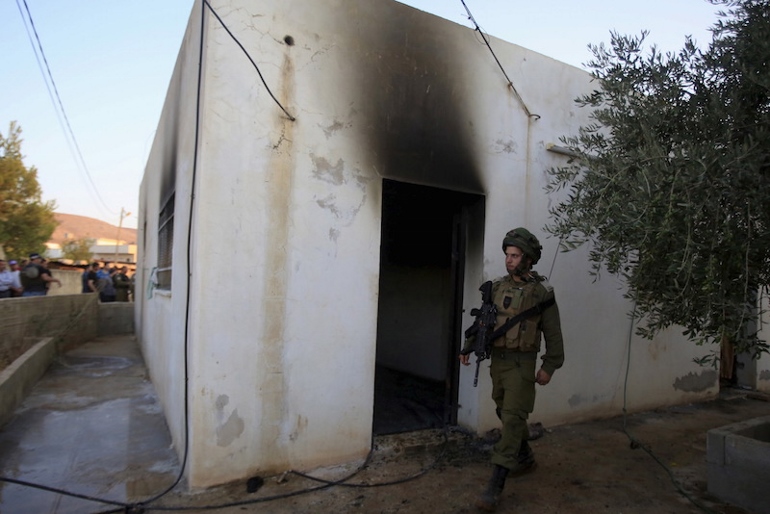
An Israeli soldier walks past a house that had been torched in a suspected attack by Jewish extremists killing an 18-month-old Palestinian child, injuring a four-year-old brother and both their parents at Kafr Duma village near the West Bank city of Nablus July 31, 2015. (RNS photo courtesy of REUTERS/Abed Omar Qusini)
Elhanan Shmidov views this illegal Jewish outpost, within earshot of the drumming ceremonies of nearby Palestinian villages, as the epitome of “self-sacrifice,” where “good Jews” like him carry out the holy mission of populating this contested land.
Shmidov, like many of his neighbors, said residents must defend their place in communities like his throughout “Judea and Samaria,” the biblical name referring to land that was once the domain of the ancient Jewish kingdom. He takes no responsibility for the Jewish extremists (whom he calls “wild weeds” within the pro-settler community), who carry out violence against Palestinians.
The increasingly radical Jewish militants who target Palestinians are the latest front in Israel’s struggle against terrorism. Israeli security authorities estimate hundreds belong to the extremist groups, but only about 100 have been involved in the violent attacks.
A July 31 arson attack by suspected Jewish extremists in the Palestinian village of Duma left a toddler and his father dead and sparked nationwide soul-searching. Prime Minister Benjamin Netanyahu denounced the act of “Jewish terrorism” and launched a crackdown that included the arrest of a number of high-profile, ultra-nationalist activists.
Many of the extremists are associated with the so-called “price tag” movement, which vows to exact a “price” by attacking Palestinian properties or people whenever Israel attempts to curb Jewish settlements in the West Bank. The origins for the movement date back 10 years, when large-scale Israeli evacuations of settlements from Gaza were perceived as a violation of both Jewish law and the peoples’ prospects for redemption.
Palestinians and the Israeli settlers have disputed the ownership of the West Bank for four decades. Some settlers, so avid in their claims to the land, have defied the Israeli government’s wishes by living in the contested zones.
Leaders among the settlers dismiss claims of terrorism by Jewish extremists as either unsubstantiated or overblown by what they call the “leftist” Israeli press. Instead, they fume about the government’s failure to keep them safe from Palestinian attacks.
“In Jerusalem, in Tel Aviv, in all of Israel’s cities, there are tons of Arabs, walking around normally … We’re the ones who are afraid!” Shmidov said.
The settlement groups organize themselves through underground networks and are often made up of members who are social outcasts or recent immigrants, said Shlomo Fischer, an expert on Jewish extremism. They include both militant and non-militant members who share a conviction that only once the land of Israel — including the West Bank — gets rid of non-Jewish elements will the nation be able to usher in an era of a “true Jewish state,” according to right-wing activists’ blogs.
Unlike previous generations, the more extreme members of the group don’t look to local leaders for guidance in carrying out attacks. Instead, they only respect extremist interpretations of religious texts and act on their own accord, Fischer said.
Itamar Ben-Gvir, a lawyer who represents “price tag” and other ultra-nationalist activists in court says that while they face persecution by a state which fails to recognize its lofty goals, they are fighting back.
“The government is trying to hurt us, but when you have faith, it’s a different story, nothing deters you.”
One of the right-wing activists, Meir Ettinger, the grandson of the famed ultra-nationalist Rabbi Meir Kahane, was recently arrested and placed under administrative detention — a controversial policy that denies the right to a trial or knowing the evidence that led to the charges.
Ettinger, 24, wrote on his blog that rather than prosecute “Arab terrorists,” Israeli police busy themselves with groups like the “hilltop youth,” young activist settlers that camp on hilltops in the West Bank, and “Lahava,” a youth organization that seeks to prevent intermingling between Arabs and Jews.
According to the Shin Bet — Israel’s security agency — members of Ettinger’s “price tag” offshoot movement called “the revolt” meet at night at different locations, share information on how to get Molotov cocktails and remain silent during police investigations, as well as plot schemes for creating anarchy and overthrowing the Israeli government in favor of a “Jewish kingdom.”
[Shira Rubin writes for USA Today.]
